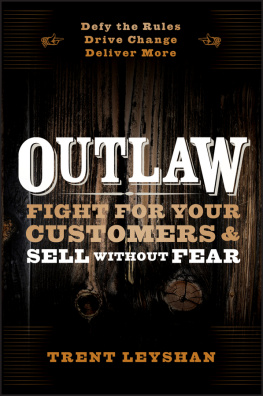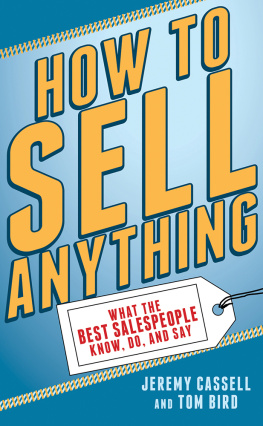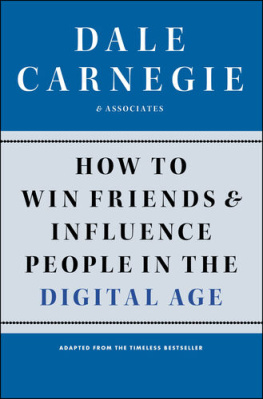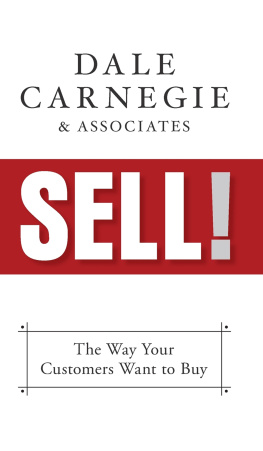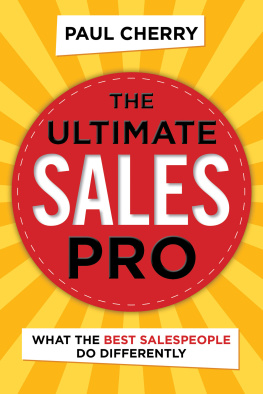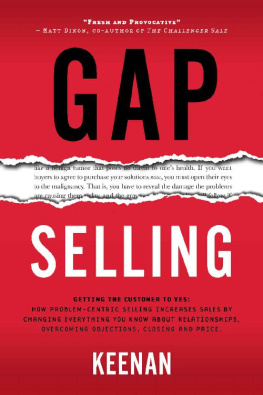Ben Zoldan - What Great Salespeople Do: The Science of Selling Through Emotional Connection and the Power of Story
Here you can read online Ben Zoldan - What Great Salespeople Do: The Science of Selling Through Emotional Connection and the Power of Story full text of the book (entire story) in english for free. Download pdf and epub, get meaning, cover and reviews about this ebook. year: 2012, publisher: McGraw-Hill Education, genre: Religion. Description of the work, (preface) as well as reviews are available. Best literature library LitArk.com created for fans of good reading and offers a wide selection of genres:
Romance novel
Science fiction
Adventure
Detective
Science
History
Home and family
Prose
Art
Politics
Computer
Non-fiction
Religion
Business
Children
Humor
Choose a favorite category and find really read worthwhile books. Enjoy immersion in the world of imagination, feel the emotions of the characters or learn something new for yourself, make an fascinating discovery.

- Book:What Great Salespeople Do: The Science of Selling Through Emotional Connection and the Power of Story
- Author:
- Publisher:McGraw-Hill Education
- Genre:
- Year:2012
- Rating:5 / 5
- Favourites:Add to favourites
- Your mark:
What Great Salespeople Do: The Science of Selling Through Emotional Connection and the Power of Story: summary, description and annotation
We offer to read an annotation, description, summary or preface (depends on what the author of the book "What Great Salespeople Do: The Science of Selling Through Emotional Connection and the Power of Story" wrote himself). If you haven't found the necessary information about the book — write in the comments, we will try to find it.
Build better relationships and Sell More Effectively With a Powerful SALES STORY
Throughout our careers, we have been trained to ask diagnostic questions, deliver value props, and conduct ROI studies. It usually doesnt work; best case, we can argue with the customer about numberspurely a left brain exercise, which turns buyers off. This book explains a better way.
John Burke, Group Vice President, Oracle Corporation
Forget music, a great story has charm to soothe the savage beast and win over the most challenging customer. And one of the best guides in crafting it, feeling it, and telling it is What Great Salespeople Do. A must-read for anyone seeking to influence another human being.
Mark Goulston, M.D., author of the #1 international bestseller Just Listen: Discover the Secret to Getting Through to Absolutely Anyone
Good salespeople tell stories that inform prospects; great salespeople tell stories that persuade prospects. This book reveals what salespeople need to do to become persuasive story sellers.
Gerhard Gschwandtner, publisher of Selling Power
This book breaks the paradigm. It really works miracles!
David R. Hibbard, President, Dialexis Inc
What Great Salespeople Do humanizes the sales process.
Kevin Popovic, founder, Ideahaus
Mike and Ben have translated what therapists have known for years into a business solutionutilizing and developing ones Emotional Intelligence to engage and lessen the defenses of others. What Great Salespeople Do is a step-by-step manual on how to use compelling storytelling to masterfully engage others and make their organizations great.
Christine Miles, M.S., Psychological Services, Executive Coach, Miles Consulting LLC
About the Book:
This groundbreaking book offers extraordinary insight into the greatest mystery in sales: how the very best salespeople consistently and successfully influence change in others, inspiring their customers to say yes.
Top-performing salespeople have always had a knack for forging connections and building relationships with buyers. Until now, this has been considered an innate talent. What Great Salespeople Do challenges some of the most widely accepted paradigms in selling in order to prove that influencing change in buyers is a skill that anyone can learn.
The creator of Solution Selling and CustomerCentric Selling, Michael Bosworth, along with veteran sales executive Ben Zoldan, synthesize discoveries in neuroscience, psychology, sociology, anthropology, and other disciplines, combining it all into a field-tested frameworkhelping you break down barriers, build trust, forge meaningful relationships, and win more customers. This book teaches you how to:
- Relax a buyers skepticism while activating the part of his or her brain where trust is formed and connections are forged
- Use the power of story to influence buyers to change
- Make your ideas, beliefs, and experiences storiable using a proven story structure
- Build a personal inventory of stories to use throughout your sales cycle
- Tell your stories with authenticity and real passion
- Use empathic listening to get others to reveal themselves
- Incorporate storytelling and empathic listening to achieve collaborative conversations with buyers
Breakthroughs in neuroscience have determined that people dont make decisions solely on the basis of logic; in fact, emotions play the dominant role in most decision-making processes. What Great Salespeople Do gives you the tools and techniques to influence change and win more sales.
Ben Zoldan: author's other books
Who wrote What Great Salespeople Do: The Science of Selling Through Emotional Connection and the Power of Story? Find out the surname, the name of the author of the book and a list of all author's works by series.

